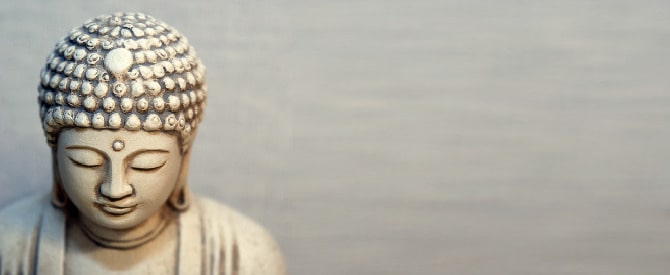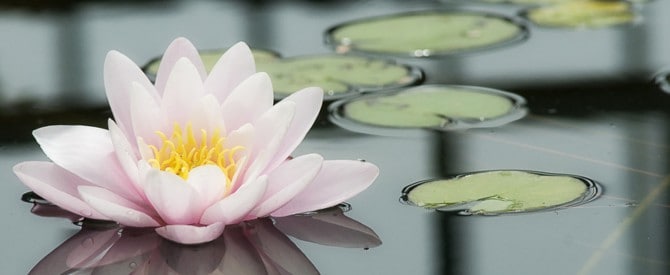What would you think of a tennis player who threw down his racket in disappointment when he lost a match? You wouldn’t think very highly of him as a sportsman, would you?
You would expect him to play his best game and mentally detach from any anxiety to win.
The word, detachment is sometimes thought to mean being without passion or a cool aloofness.
But from the standpoint of advancing our inner maturity, detachment is being fully engaged and yet not being anxious or fixated on a particular person, thing or outcome.
Detachment is an essential quality that helps to promote our spiritual growth.
Cultivate detachment and rise above fear
Fear arises when we are afraid of losing something that we like, want or cherish. When we feel fear, it is a clear signal that there is attachment.
The greater the attachment for an object, the greater the fear of losing it.
It may be a small or inexpensive thing, but if there’s some sentimental value in it, we get attached to it and fear losing it. For example, a woman received a little trinket as a gift from her husband when they were both teenagers and dating. It carries cherished memories, and she is very attached to it. To her, the small, ordinary-looking ornament is priceless, and she keeps it carefully under lock and key.
We all have many things that we fear losing. Spiritual master, Swami Chinmayananda once said, “Learn to have, not to possess.”
We must avoid possessiveness which is a form of attachment that limits our thinking and behaviour. It robs us of peace of mind and fills us with insecurity and fear.
Detachment on the other hand is being free from the fear of not having or losing something or someone. It brings fearlessness, freedom and peace of mind.
We often don’t realise that we are attached to something. On the contrary, we feel we are very detached.
How can you find out if you are really detached from something? Here are three signs:
- The thing that you like is readily available but you aren’t compelled to get it or indulge in it. You’re happy with it or without it.
- You have the time, money, physical and mental capacity to enjoy it, but choose not to. You feel content without it.
- When the thing is not there, you don’t keep remembering it or crave for it. There is no dependency or hankering.
Attachment is not true love
It’s not only things that we are attached to. We are also attached to people and other beings.
When it comes to the people in our lives, we commonly take our attachment as love for them.
In his “I love you. Letters to children,” Swami Chinmayananda shares an in-depth understanding of love and attachment.
He explains that love and attachment hold the same feeling. But there are some clear differences:
Attachment is conditional love. If attachment gives love, it’s always for some hidden payback. And if the other person doesn’t reciprocate, anger and disappointment are the result and the relationship suffers.
Attachment also expects the other person to be and behave in a way that pleases us. If he or she doesn’t reciprocate the love, we are hurt or angry.
The focus is on “me” — What can the other person give to me? What can the other person do for me? Attachment holds back love, waiting for the other person to give love first.
Attachment is disempowering. It makes us helplessly dependent on people and things for a feeling of happiness or fulfillment. We become slaves to them and lose our freedom.
Love is the total opposite. It gives unconditionally and always. It is detached from any expectations and is given freely and abundantly. It doesn’t wait on the other person to be, say or behave a certain way. It is not dependent on any reciprocal behaviour, benefits or gifts.
True love doesn’t diminish nor die away, no matter what happens. Love fully accepts the other person, giving him the space and respect to live his life, make his own decisions and even mistakes.
Love cannot help but express itself in service. It is totally focused on, “How can I give and serve my loved one?”
And so, love is happily empowering because we choose to give love rather than get love.
Since love is detached from expectations, it brings freedom for both the giver of love and the receiver. Attachment on the other hand is self-bondage.
How to cultivate detachment
There is a practice that helps us grow in our faith, detachment and inner equipoise.
The practice is keeping spiritual company or satsang every day.
What exactly is satsang? It means gaining new spiritual knowledge or reinforcing it daily through teachers or gurus either in person, through their books or online talks. It can also mean getting together with other like-minded people to pray or study spiritual or religious books. Satsang with others gives us the opportunity to discuss our spiritual journey and challenges and gain others’ perspective and encouragement.
Satsang shows us a higher outlook on life and urges us to question our goals, pursuits and values. It prompts us to think about how much time we are giving to things and people that don’t serve our higher good. This gives us a better ability to understand ourselves, handle other people and difficult situations.
Satsang frees us from our attachments to people, things and situations.
Giving up attachments does not mean that we stop loving our near and dear ones. We continue to give love, but we free ourselves of our dependency on them for our sense of happiness and well-being.
But how can we not depend on people and things for our happiness? Isn’t that the main reason why we seek out connections and meaningful relationships?
 The solution is to cultivate attachment to a higher power. When we build our relationship and attachment to God, we gradually gain strength and fulfilment from this connection.
The solution is to cultivate attachment to a higher power. When we build our relationship and attachment to God, we gradually gain strength and fulfilment from this connection.
Attachment to the divine will help us outgrow our dependency on people and things. This is a wise thing to do because the world is constantly changing. Why get attached to people and things that are always changing, and come in and out of our lives? Ultimately, we will be separated from them all.
God never changes and is ever-present and readily invoked at any time. God is our well-wisher and refuge in whom we can surrender our worries and cares.
This divinity is at the core of our being and is the very Self in us. How can we ever be separated from our own inner Self?
By attaching to this higher altar, we will be better able to bear the inevitable change and parting with people and things.
Keeping spiritual company is integral to gaining higher knowledge which will increase our discernment and detachment.
Detach and grow
Attachment holds back our growth and keeps us in fear. Conversely, detachment advances our spiritual growth, frees us from fear, false hopes and expectations of others.
Keeping daily spiritual company motivates us to view our relationships to things and people from a higher perspective.
It is a vital daily spiritual practice that cultivates detachment and promotes our spiritual growth.
Like this post? Sign up for the free fortnightly Spiritual Solutions Newsletter and receive the latest articles, news and updates in your email inbox!














